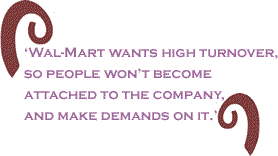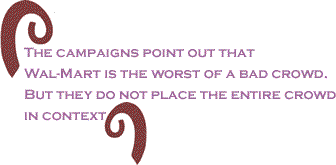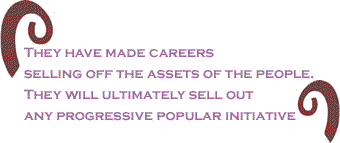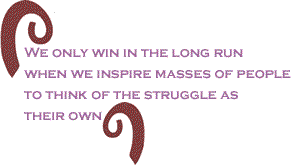
|
|||||||||||||||||||||
 |
|
How does one describe - much less defeat - the phenomenon that is Wal-Mart? A "Death Star" that destroys all other economic activity in its path? A tsunami that permanently alters the social and physical landscape of every region it washes upon? The lead horseman in an apocalyptic worldwide Race to the Bottom? Wal-Mart is all of that, and more - but powerful metaphors cannot substitute for analysis, and absent an understanding of how and where Wal-Mart fits in the deepening national and global crisis, there can be no coherent strategy to resist the juggernaut. Unfortunately, as with the contentless language of "branding" that is a hallmark of ever-consolidating capitalism, the rhetoric of resistance as often as not papers over reality in search of a "marketable" package. Activists and recruits feel good to be part of a "movement" that promises to increase humanity's chances of survival. Maintaining high morale among the troops is vital to successful activism. But if baseless "movement" talk is allowed to substitute for real movement-building, then no actual Movement will emerge. In the same vein, the more hydra-headed the beast - in this case, the Wal-Mart behemoth - the more complex are its effects on various sectors of society. Who must be "moving" before one can declare a Movement to have been born? How can the multitudinous social sectors that are injured by Wal-Mart's loathsome presence be set in motion, in some semblance of a common direction? If one has already unilaterally declared the existence of a "movement," then these questions will never be answered. The mirage of a Movement will fade and disappear, amid general demoralization.
Just as importantly, activists must be very careful to place the beast within its proper species and family. Wal-Mart is not St. George's Dragon, the last of its kind. It would be wonderful if Wal-Mart's proprietors, the Walton family, could be quarantined or made extinct in political-economic terms. However, the entire late-capitalist jungle is encroaching, and Wal-Martosaurus Rex is just the biggest predator on the prowl. Humanity is still subject to be eaten by the somewhat smaller, but equally vicious raptors. Sam Walton: The Godfather For those who seek to build mass movements, myopia is an always-fatal disease. History has shown this to be especially true in a white male dominated society like the United States. An all-day symposium titled, "Wal-Mart, Race & Gender: Local Controversies, Global Process," on January 21 at the University of Chicago, was on opportunity to put the many-faceted struggle against Wal-Mart - and the nature of the corporation itself - into context. Organized by the university's Center for the Study of Race, Politics and Culture and the Center for Gender Studies, the symposium drew about 250 people into a mostly sober discussion of the Wal-Mart menace, and the particularities of how it impacts the various groups it seeks to crush or co-opt - the kind of conversation that is sorely needed by all who claim to be "movement" people. The first panel started at the beginning: the business
model developed by Wal-Mart's founding father, the late Sam "An early employee remembers Walton could praise employees," Lichtenstein recounted, "but always reminded them that they could be replaced." From the establishment of Walton's first store in 1945, employment insecurity was central to his business philosophy.
Walton's workers were overwhelmingly white, drawn from one of "the most exclusively white regions of the nation" - the Ozarks. There, Walton capitalized on the patriarchal, small farmer mentality of his customers and employees, most of whom preferred to swallow the potion; that they were "family" rather than objects in Walton's expanding small town empire. The civil rights movement all but passed Walton's "magic circle" by. "He just didn't have to deal with it," said Professor Lichtenstein, and was able to "develop this white, rural southern culture" within his business. Many hundreds of billions of dollars later, the corporate culture headquartered in Bentonville, Arkansas began to clash with inner city sensibilities. "When you reach LA and Chicago, a lot of this doesn't work," said Lichtenstein, who directs the Center for Work, Labor and Democracy. "But it will take more than a Blue State denunciation to defeat this Wal-Mart institution." Big and Bad is Best Wal-Mart is not some unique product of the Ozarks. Rather, it is the end result of a long history of retailers seeking ever-increasing shares of the market and dominance over the companies that actually make the products. "Wal-Mart is not unusual in basing cheap goods on low wages," explained Susan Strasser, a professor of history at the University of Delaware. Nor is its fabled inventory management system something new under the sun. Since the late 19th Century, Woolworth, Sears, A&P and others "established mechanized systems…among thousands of manufacturers and millions of customers." Ironically, unions welcomed the mega stores. "Unions opposed anti-chain legislation," said Strasser, because they preferred to organize big chains rather than thousands of small stores.
Strasser noted that Wal-Mart now accounts for two percent of U.S. Gross Domestic Product. The question is relevant to labor debates today: Do unions become more powerful by hitching their fortunes to bigger and bigger companies; are mega-corporations in the interest of workers? "Never before," said Strasser, "has one retailer so dominated retailing and manufacturing in such a wide variety of goods." Does not such consolidation lead inexorably to corporate domination of society as a whole? If Wal-Mart is the logical result of late-capitalist development - which seems obvious to BC - then any "movement" must seek to set in motion forces that will resist the encroachments of capital on society, period. Hyper-aggressive and ideologically driven Wal-Mart will, for the foreseeable future, be the biggest blip on screen, but there is nothing that intrinsically sets Sam Walton's legacy apart from the others. Oppressive by design
The University of Chicago's Mae Ngai, also a professor of history, explored the notion that "if Wal-Mart raised the price of every item by just one cent, it could provide good health care for all employees." This seems to be an "argument" raised by lots of union folks, and others. But is it an argument at all, or just rhetoric that diverts attention from the true nature of the beast (which can never be a good thing to do with one's fellow strugglers)? Professor Ngai explained that Wal-Mart's business plan calls for high turnover in both goods and people. "If Wal-Mart increased wages [and benefits] workers would consider employment there as a career." But "Wal-Mart wants high turnover, so people won't become attached to the company, and make demands on it" - demands like quality health insurance, real workplace mobility, a living wage, and the effective right to organize. This is the business "model" that Wal-Mart represents. It is the late-capitalist model, not peculiar to Sam Walton's heirs. One might as well preach vegetarianism to a cannibal. Yet Wal-Mart, properly put in context, can illuminate the general environment in which we live, by virtue of its shameless, brutish, almost caricaturish behavior. The truth is, there can never be an anti-Wal-Mart "movement" that is not at its core a Movement to defang corporations. Everything depends on how activists play the cards we have been dealt. If they are only wedded to getting a contract - any kind of contract - with the beast, then failure is embedded in the plan, and the effort will be, by definition, irrelevant to vast sectors of the public. A "bad jobs" problem Annette Bernhardt's New York-based Brennan Center for Justice "does a lot of Wal-Mart work," she told the crowd. Wal-Mart has "crystallized the problem for the public" - the problem being working people remaining in poverty - but, "It's a mistake to collapse all of this just to Wal-Mart, both analytically and strategically." Wal-Mart, in its determination to oppress everyone, has also earned the largest class action suit in U.S. history, brought by female employees. Bernhardt predicts a slew of African American suits against the corporation, soon, but cautions that, "Even if Wal-Mart and others never discriminate on the basis of race and gender [this model] would hurt women and people of color" because they are bad jobs.
The retail industry as a whole "shows clear segregation based on race and gender." That is, the whole sector is a ghetto. Bernhardt points out, no matter the management, retail "big boxes" do not bring good jobs or economic development to communities. The issue "goes beyond whether Wal-Mart is a good or bad employer," said Steven Pitts, a labor specialist with the University of California at Berkeley Center for Labor Research and Education. There is a "crisis in the Black community…. We need a movement for quality jobs." Pitts is one of the authors of the study, "Beyond Wal-Mart: The Need for Quality Jobs in Black America." "There is a crisis of unemployment, but equally important, there is a crisis of bad jobs in the Black community." Pitts had earlier distributed charts showing the disproportionate distribution of "bad" jobs among Blacks in the Bay Area and Chicago. However, Pitts once again injected the notion that the problem could be substantially ameliorated, if not solved, if Wal-Mart would simply increase prices by two percent. "Stuff that costs a dollar would cost $1.02. I think we can handle that" as consumers. But of course, Wal-Mart would not be Wal-Mart if it did that, and the Wal-Mart "model" is now the globalizing corporate model. Besides, Wal-Mart does not want to make its workplace a career destination, an incubator of families. Retention of longtime employees is in diametric opposition to its core business plan. In other words, Wal-Mart has no intention of being a "good corporate citizen." Pitts: "I'm not saying ‘Wal-Mart out.' I'm saying come in correct." Ease of corporate penetration The "community discussion" segment of the symposium zeroed in on the actual battle to keep Wal-Mart out of Chicago, a year and a half ago, which resulted in one of two stores - the West Side outlet - being approved by a generally corrupt and/or confused City Council. Alderman Howard Brookins, of the South Side 21st Ward, denied that he was "pro-Wal-Mart," although he voted to let the company in because he thought it best for his ward. "We have not had adequate shopping choices in the South Side," said the young alderman, claiming that Chicagoans spend $500 million a year in Wal-Marts located just across city lines. It turns out these are Wal-Mart supplied figures - but certainly the South Side has greatly diminished "shopping choices," and many Chicagoans do spend their money at suburban Wal-Marts. Margaret Garner, a youthful-looking CEO of the Black construction firm chosen to build Wal-Mart's West Side store, spoke to the question of "Why Wal-Mart is Good for Black and Female Owned Companies." Graciously and diplomatically, Garner thanked critics for "making Wal-Mart a better corporation…. By holding Wal-Mart accountable you are affecting change within that corporate structure." A one-time contracting innovation in the heat of an urban battle, perhaps, but a significant deviation from the core corporate business plan? No. The dialogue, which was in the main civil and reasoned, clearly demonstrated that the particularities of the Black inner city condition - utter desperation among the poor, pent-up but unused capabilities among the upwardly mobile - provide Wal-Mart with plenty of openings to penetrate African American political structures. If the debate is limited to the virtues of a politically powerless urban desert versus a politically prostrate jurisdiction that at least has a big, cheap store, the Waltons will eventually win. If they need only distribute a few contracts here and there in a community in which the public has no real role in overall planning, then Wal-Mart will triumph by default - just as its corporate brethren do every day of the year. One symposium participant pointed out that the Inglewood, California battle against Wal-Mart penetration was successful in 2004, despite the corporation's massive bribes and advertising budget, because the organizers were able to frame the discussion in terms of people's power and the necessity of "respect" for citizens - terms that resonate among African Americans. "Wal-Mart uses people as a pimp does," said Rev. Reginald Williams, of Trinity United Church of Christ, to enthusiastic applause. "We want jobs that will add to the life of the community." It is the beginning of a general demand that requires a whole community be addressed as citizens. The logic of such a demand can only be satisfied through a campaign for institutional community empowerment - a much broader concept of democracy. Rev. Williams: "Price over Principle equals Prostitution." From the faith-based perspective of the social gospel, Wal-Mart is bad for the West Side, said Rev. Elce Redmond, of the South Austin Community Coalition. Wal-Mart is lying to the people - disrespecting them - with its promises to hire convicted felons and young people from the immediate neighborhood. "Hire young people? Not the ones hanging on the corner, not those kids." Rev. Williams said Wal-Mart had poisoned the discussion by painting "all unions as bad, racist, based on the records of the building trades." It is true that the building trades are a heavy cross to bear. Maybe too heavy. "We allowed Wal-Mart to frame the issue as Wal-Mart versus the unions, rather than Wal-Mart versus the community," said James Thindwa, of Chicago Jobs With Justice. "They spent a lot of money to break up our coalition. We had not anticipated that Wal-Mart would use its clout…and pay off the opposition. Frankly, we didn't realize the depth of the leadership crisis in the Black community." Sixth Ward Alderwoman Freddrena Lyle, a longtime activist, won't be turned around by Wal-Mart lies and blandishments. "We have to get back in the game. We have to push our legislators." The "game" must be played on the court of elemental citizens rights. Black people - having been property - understand full well that citizens' rights must trump property rights; we are the one group for whom the alternative is obvious. Towards a Movement for Democratic Development The following remarks were prepared by symposium participant and BC Editor-in-Chief Glen Ford. Almost two years ago, I was invited to Chicago to speak to the Wal-Mart issue. The question for me was, How do we create the conditions in which citizens can effectively determine who can do what in their city? - a larger subject than just Wal-Mart's attempt to invade Chicago. We at BC had decided that this larger question led logically to the creation of a Movement to allow people to determine how their cities are developed. Since we're at the end of Martin Luther King week, it's proper to discuss Wal-Mart in the context of the Black Movement. Unfortunately, there is no Black Movement. I'd like to talk about Wal-Mart in the context of the U.S. Labor Movement. Unfortunately, there is no U.S. Labor Movement at this time, worthy of the name. Instead, there are various campaigns undertaken by Blacks and by labor - and sometimes jointly by Blacks and labor. But campaigns are not Movements. Campaigns have beginnings and ends. Victory is declared when limited objectives are achieved. Campaigns are not self-regenerating. When one is over, another has to be kicked-started into existence. Campaigns can become Movements. The campaigns against Wal-Mart have that potential, if they can be linked in the public imagination to life-transforming objectives. The Katrina catastrophe has great potential to give birth to a Movement. There are literally thousands of Katrina-related projects operating throughout Black America. But they are not connected to one another, either through coordination, or by a shared vision of what the political response to Katrina should be. Beyond horror and outrage, what does the Katrina experience call upon us to do, other than help the evacuees?
It is good and necessary to help the evacuees. But that's a campaign, not a Movement. It is also good and necessary to resist every effort to plant Wal-Marts in Chicago, or to tailor specific legislation that impedes Wal-Mart from invading New York City, or to rein in its abuse of employees and taxpayers in Maryland. These are worthy campaigns. But they do not directly confront growing corporate hegemony over all aspects of American life. The campaigns point out that Wal-Mart is the worst of a bad crowd. But they do not place the entire crowd in context, so that large numbers of people will see "Wal-Mart" in a whole range of corporate behaviors. Once that type of vision takes hold, people who have little or no contact with anti-Wal-Mart organizers begin to contemplate anti-corporate actions on their own, in sectors unrelated to retail. At that point, you have the makings of a Movement. I'll give an example from the Civil Rights Movement. The original idea for the Montgomery bus boycott was for a short action with very limited goals. More conservative elements of the local NAACP envisioned a brief demonstration boycott. The goal was to tweek Jim Crow so as to allow Blacks to fill up the bus from the back, while whites filled it up from the front. The two groups would meet somewhere in the middle, depending on ridership - but there would be no empty seats reserved for whites while Blacks stood. If that was the way things had worked out, we would not recognize the Montgomery bus boycott as the beginning of the modern Civil Rights Movement.
Instead, the Black people of Montgomery decided that, if they were going to do all that walking and risk losing their jobs, it better be for total desegregation of the busses. And suddenly, there emerged a mass vision of the total destruction of Jim Crow, rather than a gradual easing of its more savage aspects. Eight years later, there were 10,000 separate civil rights related actions in 1963, alone. The SCLC couldn't do that. CORE couldn't do that. SNCC couldn't do that. And the NAACP wouldn't do that. The people were investing in a Movement that would fundamentally change their lives. The "civil rights" agenda was essentially completed in a little over one decade. The last important civil rights legislation, the Fair Housing Act, was passed in 1968. So, what's that got to do with Wal-Mart, 2006, you say? Why is Glen going off-subject? I'm trying to paint a broad picture, here. I'm talking about how we got to this dark and scary point in history, and why we need a real Movement - what we at Black Commentator call a Movement for Democratic Development. But we still have to go back to 1968. Dr. King had already written his book, "Where Do We Go From Here?" What he meant was, "Where do we take the Mass Movement, from here?" King had no intention of shutting down the Mass Movement. Rather, he would direct it against the Triple Evils: Racism, Militarism, and Economic Exploitation. King played a huge role in getting southern Blacks the right to vote - but he didn't believe that electoral politics was sufficient for real social transformation. King supported Blacks who climbed up the corporate ladder, or made lots of money in business. But that doesn't put much of a dent in the Triple Evils. King didn't get far in his redirection of the Mass Movement before he was shot down. And, almost immediately, the aspiring Black office holders and corporate actors seized the stage and proceeded to shut the Movement down. Some of these players came from King's own ranks. For many of those seeking political office, the Black masses are only useful on election day. The rest of the time, they are nuisances. And Black business types don't want mass action unless it is in support of them getting a contract. These elements were as responsible as Cointelpro for the demise of the Movement. Black politicians gained control or great influence in cities with no plan at all except to give contracts to Black businesses. Their only idea for coping with corporate divestment of the cities was to auction off, give away, and even pay corporations to take city assets.
The cure for what ailed the cities, they thought, was the return of capital, and the return of whites. When the cycle of divestment finally exhausted and reversed itself, these electoral leaders continued to give the city jewels away - including tax revenues for a generation into the future. This political class is more than useless - it is bankrupt and must be replaced. They have made careers selling off the assets of the people. They will ultimately sell out any progressive popular initiative. Getting rid of them will require a Movement. At the center of any Movement is a principle that is popularly understood. For the Movement for Democratic Development, that principle must be: No project can be called "development" unless it benefits the existing population of the city. Not new populations, but the existing population. Otherwise, it is destruction - not development. We are now speaking of the context in which Wal-Marts should be evaluated, here in Chicago and anywhere else. Yes, we know that Wal-Mart is a Death Star that destroys jobs and all economic activity but its own within a wide radius of the store. But what about all the other corporate players? Why just Wal-Mart? What is the best Grand Plan for the city, one that serves the existing population? And how are the people's aspirations - their dreams for their neighborhoods - made central to the larger scheme? If the focus is Wal-Mart, then we are engaged in a campaign. If the goal is to empower the people to fight Wal-Mart and any other corporate predator - to democratize planning and development - then we are talking about building a Mass Movement, one that can regenerate itself. Because the people never run out of dreams. To create a Movement for Democratic Development we need more than general loathing, disgust and anger over Wal-Mart, although that's a good start. We need information on every aspect of the city. We need information so that people can develop their own plans for the city. Corporations know everything they need to know before they target a city - infinitely more than the city officials with whom they "negotiate," if you can call it negotiation. The actual process is more like corporate bullying and extortion. Activists seeking to build a Movement must know as much as the corporations about the city's assets: public and private, infrastructure and installations, vistas and brownfields. A basic task is to do an audit of the city's assets, as the basis for people-oriented planning, and to bargain competently with corporations. This requires assembling teams of experts from many disciplines - civil engineers, architects, progressive city planners, educators - people who collectively understand what makes a city tick. Plus organizers, organizers, organizers. The task doesn't require a large group, or prohibitive amounts of money. SNCC damn near changed our part of the world with relatively small numbers and almost no money. Today, Black progressives and their allies are represented in all the necessary disciplines - and I am confident they are willing to work, cheap. The consequences of not having a plan for your city were made horrifically clear in New Orleans, recently. The American Institute of Architects and the Urban Land Institute had collaborated with big capital to devise a "plan" for the new New Orleans - half the size of the old New Orleans and missing most of its Black population. It was a detailed plan, adopted by the Mayor's Commission and released as if it were the product of a governmental process. New Orleans activists held their own conference. It featured a handful of experts, none of whom had done a real study of the city: an urban expert from Sydney, Australia, an MIT guy who used to be New York Mayor David Dinkins' housing aide, and a brother who helped rebuild the small town of Princeville, North Carolina, after a flood in the Nineties. It was a very uneven match.
The window that slammed suddenly shut on Black New Orleans is incrementally closing on Black and brown populations in many other cities. Gentrification accomplishes over years what Katrina did in days. When the window closes - when there is no longer sufficient critical mass of Black people in the cities - the Great Game of this epoch will be over, and we will have lost. And we will have lost no matter how much frustration we may have caused Wal-Mart before the window closed. We only win in the long run when we inspire masses of people to think of the struggle as their own. A Movement for Democratic Development would place Wal-Mart in the context of the full range of capital's destructive activities in urban America. It would come to grips with gentrification, the phenomenon that impacts each inner city household and the political and geographic destiny of the whole people. Such a Movement would aim to seize control of city and county governments, so that the people would have the tools to transform their entire city - to make it a decent place for the existing population. That's something folks can get their teeth into. If we are consciously pursuing such a goal, we might just get ourselves a real Movement - one that will spawn a whole new political leadership. Amidst these disjointed campaigns orbiting Wal-Mart, Katrina and other struggles, there is the stuff of a Movement out there - the stuff of human inspiration. To paraphrase Dr. King, I envision a situation in which the activist engages the citizen and says: "YOU have a dream. Let's get to work on it." BC Publishers Glen Ford and Peter Gamble are writing a book to be titled, Barack Obama and the Crisis in Black Leadership. |
|
| Home | |
Your comments are always welcome. Visit the Contact Us page to send e-Mail or Feedback or Click here to send e-Mail to [email protected] e-Mail re-print notice
If you send us an e-Mail message we may publish all or part of it, unless you tell us it is not for publication. You may also request that we withhold your name. Thank you very much for your readership. |
|
| February 16, 2006 Issue 171 |
||||||||||||||
|
||||||||||||||
|
||||||||||||||
| Printer Friendly Version in Plain Text or PDF format. Download free Adobe Reader. | ||||||||||||||
 |
||||||||||||||
 |
||||||||||||||
 |
||||||||||||||
| |
||||||||||||||
| |
||||||||||||||





































